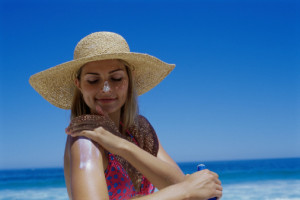Sunscreen smarts

Does my sunscreen expire?
Is sunscreen spray or lotion better?
What’s the difference between UVA and UVB?
Before you head to the beach or lake this summer, check out the answers to some of the most common frequently asked questions about sunscreen from Riddle Hospital dermatologist Gopal Patel, MD.
Do I need to buy a separate sunscreen for my face, or can I use the same one I use on my body?
Sunscreen will be equally as effective on your face and body, but some people prefer creams or sticks for their face, as they are easier to apply.
Will I still get a tan if I use sunscreen?
Many people are tempted to skip sunscreen in pursuit of a golden tan, but wearing sunscreen doesn’t mean you won’t get any color. Look for alternative ways to darken your complexion, like sunless tanner and spray tans.
Do I have to buy a new bottle of sunscreen, or can I use what’s left over from last year?
Thanks to rules from the FDA, all sunscreens are required to retain their strength and skin-protecting properties for at least three years, unless an expiration date is otherwise noted. However, if you notice any changes in color or consistency, play it safe by throwing it away and purchasing a new bottle.
What ingredients in a sunscreen are important?
Most importantly, you want a broad spectrum (UVA/UVB) sunscreen that is SPF30 or greater and water resistant. Beyond that, you want to find a sunscreen that feels comfortable and that you know you will use. If you’re looking at ingredients, I find that zinc oxide and titanium dioxide offer the best value as they reflect both wavelengths of light and, as such, are considered physical blockers.
Which is better: sunscreen spray or lotion?
The best sunscreen is the one you will use most frequently. It really is a matter of personal preference: you’ll get the same protection, as long as you make sure you apply the right amount. There are some sunscreens available specifically for dry or fair skin, so look for those if it applies to you. Although lotions, creams, wax sticks, and ointments have all been approved, the FDA’s regulations do not include spray sunscreens. If you feel more comfortable, choose one of the tried-and-true methods.
What’s the best treatment for sunburn?
You should begin a treatment regimen when you first notice your sunburn. Try taking a cool bath or shower, and patting yourself dry afterwards. Don’t dry off completely—leave some water on the skin and apply a moisturizer to trap the moisture. You can use hydrocortisone cream to help ease any discomfort, and aspirin or ibuprofen can help reduce redness or swelling, as long as you don’t have any medical condition preventing you from using these. As your burn heals, continue to drink plenty of water to stay hydrated.
It’s best to avoid the sun until your skin heals, but if you absolutely need to be outside, cover yourself—especially sunburned areas—completely.
What’s the difference between UVA and UVB rays?
UVA and UVB rays can both be damaging, but in different ways. Ultraviolet A (UVA) rays can penetrate deep into the skin’s thickest layer, which can lead to premature aging and affect the immune system. Ultraviolet B (UVB) rays burn the outer layers of the skin and are most prevalent during 10 AM and 4 PM. For the best sun protection, look for sunglasses and sunscreen that protect against both types.
When it comes to sunscreen, does a higher number mean better protection, what’s the best way to use sunscreen?
There is no way to block 100 percent of the sun’s damaging rays, but higher number SPFs can block more of the sun’s rays than lower ones, if applied correctly. The reality is that most people do not apply enough sunblock. Typically, one ounce of sunscreen is only considered an adequate amount to cover the sun-exposed areas of an average person. Unfortunately most people only use a fraction of that amount. Furthermore, sunscreen should be applied 15 minutes prior to sun exposure. Aim for sunscreen with an SPF of at least 30 that is also water-resistant and remember to reapply every 2 hours…and don’t forget the value of sun avoidance and sun protective clothing.
 Content you want, delivered to your inbox
Content you want, delivered to your inbox
Want to get the latest health and wellness articles delivered right to your inbox?
Subscribe to the Well Ahead Newsletter.
